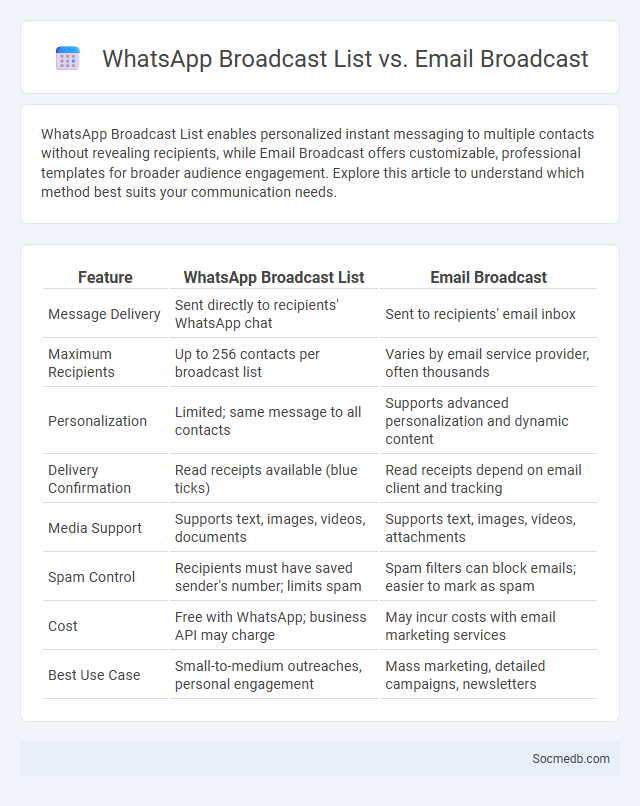
Photo illustration: WhatsApp Broadcast List vs Email Broadcast
WhatsApp Broadcast List enables personalized instant messaging to multiple contacts without revealing recipients, while Email Broadcast offers customizable, professional templates for broader audience engagement. Explore this article to understand which method best suits your communication needs.
Table of Comparison
| Feature | WhatsApp Broadcast List | Email Broadcast |
|---|---|---|
| Message Delivery | Sent directly to recipients' WhatsApp chat | Sent to recipients' email inbox |
| Maximum Recipients | Up to 256 contacts per broadcast list | Varies by email service provider, often thousands |
| Personalization | Limited; same message to all contacts | Supports advanced personalization and dynamic content |
| Delivery Confirmation | Read receipts available (blue ticks) | Read receipts depend on email client and tracking |
| Media Support | Supports text, images, videos, documents | Supports text, images, videos, attachments |
| Spam Control | Recipients must have saved sender's number; limits spam | Spam filters can block emails; easier to mark as spam |
| Cost | Free with WhatsApp; business API may charge | May incur costs with email marketing services |
| Best Use Case | Small-to-medium outreaches, personal engagement | Mass marketing, detailed campaigns, newsletters |
Introduction to Broadcast Messaging
Broadcast messaging on social media platforms enables the simultaneous distribution of messages to large audiences, enhancing communication efficiency and engagement. This method is essential for brands and organizations aiming to deliver timely updates, promotions, or alerts across multiple channels like Facebook Messenger, WhatsApp, and Instagram Direct. Utilizing broadcast messaging increases reach while maintaining personalization through segmentation and targeting features embedded in social media management tools.
What Is a WhatsApp Broadcast List?
A WhatsApp Broadcast List is a feature that allows you to send a single message to multiple contacts simultaneously without creating a group chat. Your recipients receive the message individually, maintaining privacy as replies come only to you. This tool streamlines communication for announcements, promotions, or updates to large audiences efficiently.
Understanding Email Broadcasts
Email broadcasts are mass messages sent to a targeted list of subscribers, designed to engage, inform, or promote offerings in your social media strategy. Crafting personalized content and segmenting your audience enhances open rates and click-throughs, driving higher engagement across platforms. Leveraging analytics from email campaigns allows you to refine messaging and optimize reach, boosting the overall effectiveness of your social media marketing efforts.
Comparing Broadcast List Platforms
Comparing broadcast list platforms reveals significant differences in features, user interface, and audience engagement capabilities. WhatsApp Broadcast Lists allow direct messaging up to 256 contacts simultaneously, ensuring personalized communication without group exposure. Your choice of platform depends on the size of your audience, message customization needs, and integration with other social media tools.
Audience Reach: WhatsApp vs Email vs Others
WhatsApp boasts over 2 billion active users globally, making it a powerful tool for broad audience reach with instant message delivery and high open rates surpassing 98%. In contrast, email marketing reaches approximately 4 billion users but faces challenges with spam filters and average open rates around 20-25%. Your choice depends on targeting real-time engagement through WhatsApp or scalable, content-rich campaigns via email, while platforms like Facebook and Instagram offer diverse but more segmented audience options.
Message Personalization and Engagement
Message personalization on social media uses data analytics and AI algorithms to tailor content based on user preferences, behaviors, and demographics, boosting relevance. Personalized messages increase engagement rates by fostering genuine connections, driving higher click-through rates, and improving user retention. Platforms utilizing dynamic content and targeted messaging strategies see significant improvement in audience interaction and brand loyalty.
Privacy and Compliance Considerations
Social media platforms must navigate complex privacy regulations such as GDPR and CCPA to protect user data and ensure compliant practices. Implementing robust data encryption, transparent user consent mechanisms, and regular privacy audits helps mitigate legal risks and maintain user trust. Businesses leveraging social media should prioritize compliance frameworks to avoid penalties and uphold data security standards.
Analytics and Performance Tracking
Social media analytics involves collecting and measuring data from platforms like Facebook, Instagram, and Twitter to evaluate campaign effectiveness and audience engagement. Key performance indicators (KPIs) such as reach, impressions, click-through rates, and conversion rates provide actionable insights to optimize content strategy. Advanced tools like Google Analytics, Hootsuite, and Sprout Social enable real-time performance tracking, helping businesses refine targeting and maximize ROI.
Cost and Resource Requirements
Managing social media effectively demands significant cost considerations, including advertising budgets, content creation expenses, and platform management tools. Your time investment and human resources are critical for consistent posting, engagement, and analytics monitoring to achieve measurable results. Allocating sufficient monetary and personnel resources ensures optimized social media performance and a higher return on investment.
Choosing the Best Broadcast Solution for Your Needs
Choosing the best broadcast solution for your social media needs involves evaluating platform compatibility, streaming quality, and audience engagement features. You should prioritize solutions that offer reliable video encoding, low latency, and seamless integration with major social channels like Facebook, YouTube, and Instagram. An optimized broadcast tool enhances your content's reach and ensures professional delivery tailored to your specific goals.
 socmedb.com
socmedb.com